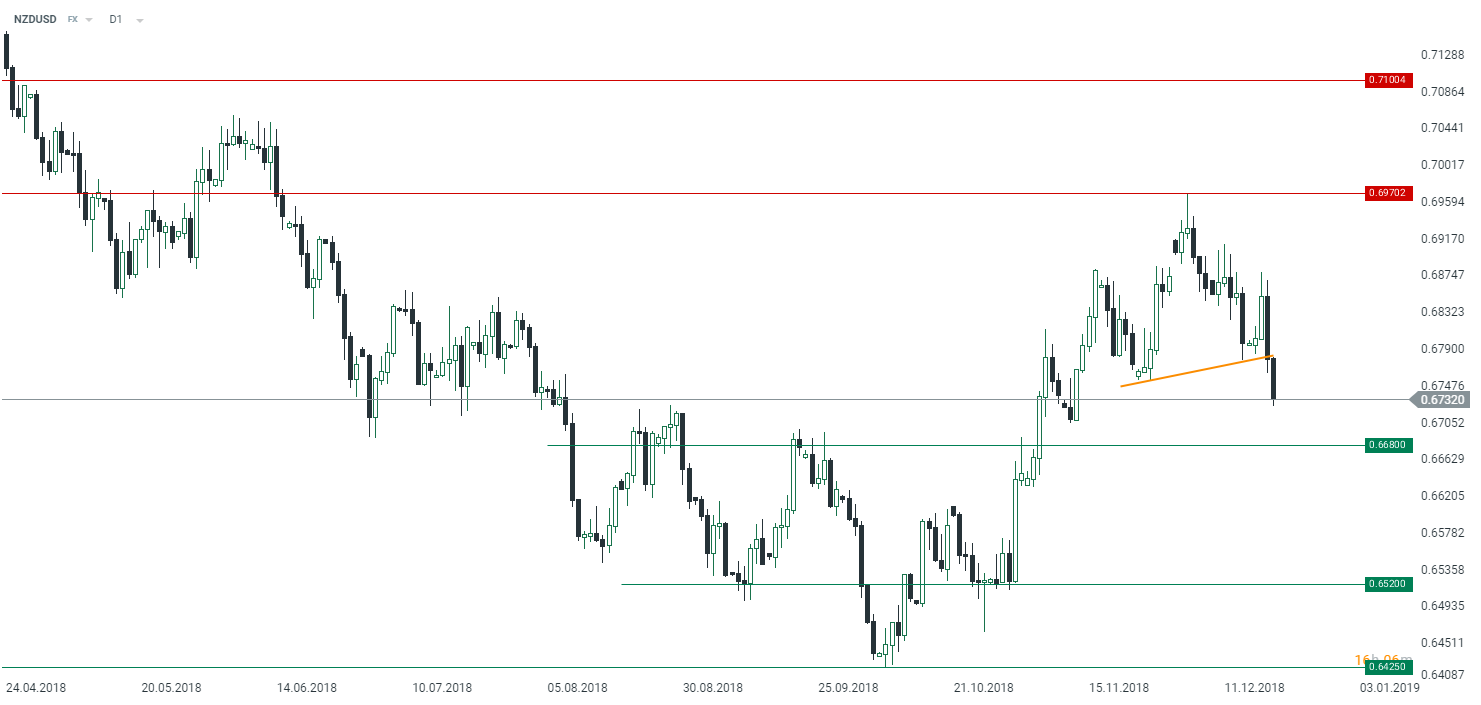Summary:
-
Fed raises rates but cuts a number of hikes for the next year
-
New Zealand’s GDP disappoints and sends the kiwi much lower
-
Australian jobs report turns out to be strong but details not so encouraging
-
BoJ stays on hold at its final meeting this year
Undeterred
In line with expectations the Federal Reserve decided to deliver the fourth interest rate hike this year lifting a target for the federal funds rate to 2.25-2.5%. Along with the decision we were offered fresh economic projections and they were more or less unchanged compared to the September’s forecasts. However, what did change is the path of rate hikes for the upcoming years and this is especially true when it comes to the following year as the median of ‘dots’ was revised to two from three meaning the FOMC participants expect, on average, less tightening than they thought three months ago. Furthermore, the long-run rate projection was lowered as well to 2.8% from 3% suggesting the US central bank sees a shallower rate path ahead. Even as the Fed thinks that rates will be raised twice in 2019 and once in 2020 we think that a balance of risks to these forecasts is tilted to the downside and we reckon that the next year could be the last with any rate hikes in the US while the second half of 2020 could be the first year when talks about a rate cut might take place.

The Fed sees less rate hikes than expected but still more than market participants anticipate. Source: Federal Reserve
These moves seem to be stocks positive and US dollar negative but it is all about expectations and they had pointed to even more dovishness from the Fed. As a result, the US dollar jumped immediately after the decision was announced while the US stock market tumbled. The NASDAQ (US100) was the most affected and lost as much as 2.2% while the Dow Jones (US30) and the SP500 (US500) declined 1.5% each. The yield on the 10Y bond dropped markedly to 2.75% reaching its second lowest point this year (the bottom was seen at the beginning of April and was situated just a touch below 2.75%). The 10s2s yield spread shrank noticeably from above 16 bps to below 10 bps at the time of writing mirroring the Fed’s stance - more hikes of the FFR (they lift the short-end of the curve) and the lower neutral rate (it weighs on the longer-end of the curve). Therefore, this stance should constantly lead us to a further yields compression and ultimately to a reversal of this segment of the curve. During the press conference Jerome Powell underlined that now the federal funds rate is around the lower range of the estimated neutral rate signalling that the Fed could be relatively close to the end of monetary tightening. Asked about comments from Donald Trump Powell said that nothing will deter the Federal Reserve from doing the right job they think they do. The US dollar strength is vanishing this morning with the Japanese yen rising almost 0.5% reflecting the bleak session in the Japanese equity market where the NIKKEI (JAP225) plunged 2.8%. Stocks in Shanghai and Hong Kong are more trading also lower on the day - the former is declining 0.8% while the latter is falling 1.3%.

The NASDAQ (US100) fell substantially on Wednesday and it almost approached the support nearby 6235 points. This level could be seen as the last resort for bulls. Source: xStation5
Antipodean currencies lower
Both AUD and NZD are trading lower this morning despite that fact that the US dollar is struggling (it is down against EUR, GBP or JPY). From Australia we got the November’s jobs report producing quite solid numbers. Employment grew 37k and beat the consensus of a 20k increase (the October’s value was revised down to 28.7k from 332.8k though) but the details were not so encouraging. The entire change in employment came from part-time jobs which rose as much as 43.4k and full-time jobs decreased 6.4k. On top of that, the unemployment rate ticked up to 5.1% from 5% albeit this increase was fully offset by a rise in the labour force participation rate which moved up to 65.7% from a revised 65.5%. While the underlying strength of the labour market remains robust, some less upbeat signs have arisen of late. Notice that in spite of the fact that the market is remarkably tight, inflationary pressured have been subdued as of yet, a phenomenon known across the globe. Therefore, the RBA is not in rush to tighten policy anytime soon and given the fact that the Fed forecasts less rate hikes ahead (just two in 2019 and one in 2020) we think that a window to raise rates in other central banks will be relatively short.

New Zealand’s GDP disappointed in the third quarter sending the kiwi lower. Source: Macrobond, XTB Research
The NZ’s economy expanded 2.6% YoY in the three months through September falling short of the median estimate of a 2.8% YoY increase and clearly below the pace seen in the second quarter of 3.2% YoY. The breakdown of this growth does not look well as the inventories’ contribution was the greatest since the second quarter of 2014 and added virtually 1 percentage point, when this category is stripped out then the rate of growth is well below 2%. The slower rate of growth means that less pressure on inflation is likely and if so, the Reserve Bank of New Zealand could be forced to cut interest rates in several quarters (some local banks are already forecasting such moves from the end of the next year). In response to this data the NZ dollar slid and broke below its important technical support line. Note that the interest rate market is assigning 16% chance to see a rate cut until May 2019.
 The NZDUSD moved below the trend line and it seems to be en route to 0.6680. Source: xStation5
The NZDUSD moved below the trend line and it seems to be en route to 0.6680. Source: xStation5
In the other news:
-
Bank of Japan left monetary policy settings unchanged at its final meeting this year
-
PBoC said it would supply lower-cost liquidity to banks willing to lend more to smaller companies
-
Japan’s machine tool orders fell 17% YoY in November after falling 16.8% YoY in October
This content has been created by XTB S.A. This service is provided by XTB S.A., with its registered office in Warsaw, at Prosta 67, 00-838 Warsaw, Poland, entered in the register of entrepreneurs of the National Court Register (Krajowy Rejestr Sądowy) conducted by District Court for the Capital City of Warsaw, XII Commercial Division of the National Court Register under KRS number 0000217580, REGON number 015803782 and Tax Identification Number (NIP) 527-24-43-955, with the fully paid up share capital in the amount of PLN 5.869.181,75. XTB S.A. conducts brokerage activities on the basis of the license granted by Polish Securities and Exchange Commission on 8th November 2005 No. DDM-M-4021-57-1/2005 and is supervised by Polish Supervision Authority.


